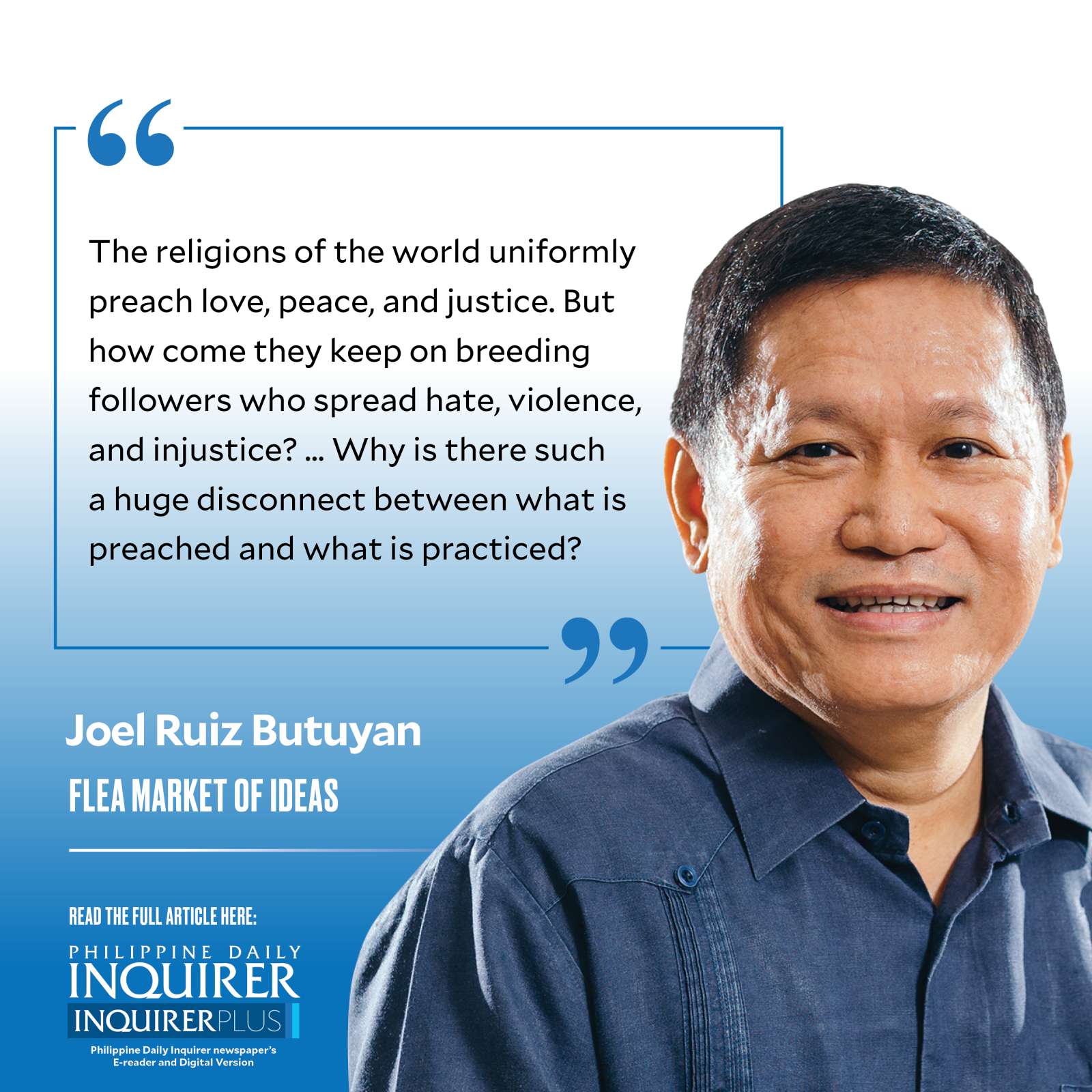Religions of peace

The religions of the world uniformly preach love, peace, and justice. But how come they keep on breeding followers who spread hate, violence, and injustice? Religions have brought so much death, suffering, and destruction, in the history of humanity. Why is there such a huge disconnect between what is preached and what is practiced?
The ongoing war between Israel and the Palestinian militant group, Hamas, is the latest episode of unspeakable human tragedies fomented by religions. On the surface, the conflict is a dispute over territory, power, and oppression, but it’s differences in religion that are at the core of this long-running conflict. The two sides can’t seem to agree to live together because of differences in religious beliefs, which translate into so many differences in ways of life.
The most frequent sources of religious conflict emanate from the followers of Christianity, Islam, and Judaism. Ironically, these three religions have so many commonalities. All three subscribe to monotheism, which is the belief in one God. Jews, Christians, and Muslims all recognize Old Testament figures such as Adam, Noah, Abraham, Isaac, Jacob, Moses, David, Solomon, Elijah, Elisha, and Ezekiel. Jews and Muslims trace common ancestry to the prophet Abraham. Muslims regard Jesus as a great prophet. Jews and Muslims have similar dietary rules such as abstinence from pork, and the necessity of food rituals (kosher for Jews and halal for Muslims).
Article continues after this advertisementIf there are primary commonalities, why then is there so much hate and violence among many followers of these three religions?
Religions are among the most powerful conceptual inventions of mankind. Religions define people’s concepts of right and wrong. Countries have been created along religious lines. People’s diets and clothing are dictated by religion. Religious customs are the foundations of cultural traditions. Wars are waged in the name of religion. Religion remains the single biggest factor that shapes our different ways of life, even trumping the influence of the natural environment.
But what started as core religious beliefs became covered in thick layers of rituals and traditions, in the course of time. Many of the faithful eventually embraced these rituals and traditions as the very essence of their faith, overshadowing the core beliefs shared with other religions. As a result, differences got amplified, and core similarities went out of the radar. Religions have also been employed as instruments of conquest. Kings and rulers utilized religion to rally the troops, while religious leaders piggybacked on conquests in order to expand their spiritual dominion. To this day, all three religions have heavily calcified remnants of their heritage as instruments of conquest. When conflict and violence erupt, the nature of every religion as a weapon of war rears its ugly head. Religious leaders may need to reflect on the tone, emphasis, and direction of their teachings, because the prominence given to rituals and customs—without highlighting the primacy of the core beliefs of love, peace, and justice—is supplying inexhaustible fuel to wars.
Article continues after this advertisementSpiritual leaders have a choice. On one hand, they can continue emphasizing the superiority of their respective religions, their monopoly of access to heaven, and the claimed damnation in hell for followers of other religions. A choice of this path will give us more of the same—religions of war. On the other hand, religious leaders can exalt the core beliefs of love, peace, and justice which are shared convictions of all religions. A choice of this path will foster religions of peace.
Those who espouse superiority of belief and exclusivity of salvation have this riddle to answer: Is a little girl born in a remote Afghan village condemned to die in hell, all because she will never have access to the Bible or the Torah all her life? Is a little boy who grows up in Barangay Afusing Bato, Alcala, Cagayan, predestined for the underworld just because he will never have any means of getting hold of the Quran? A cruel and unjust god is worshipped by those who subscribe to such beliefs. People should realize that their understanding of the words of any of the holy books is mere interpretations and opinions, which are oftentimes riddled with biases and misconceptions.
Aspiring to transform our religions into instruments of peace may sound like a pipe dream. Thankfully, however, Pope Francis and the late Pope and Saint John Paul II have accomplished so much groundwork in this direction, with their initiatives on interfaith dialogues with other world religions and ecumenism among all Christian groups.
There are also the path-breaking teachings of the Second Vatican Council of the 1960s which acknowledged that the “plan of salvation also includes those who acknowledge the Creator, in the first place among whom are the Muslims.” Vatican II further exhorts that “following the footsteps of the holy Apostles Peter and Paul, the sacred Council earnestly begs the Christian faithful … to be at peace with all men … and in that way to be true sons of the Father who is in heaven.” These extraordinary initiatives that promote universal peace must be pursued, strengthened, and made widespread if we are to set our religions free from the agents of war and violence.
















